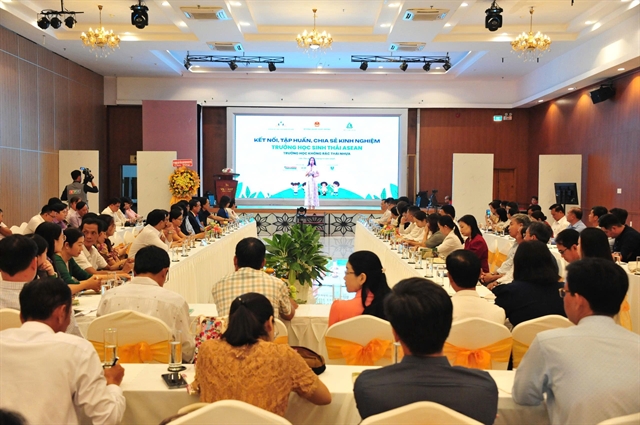 Society
Society

 |
| Representatives attend the workshop. — Photo NÔNG NGHIỆP VÀ MÔI TRƯỜNG |
CẦN THƠ — Eco-schools are transforming classrooms into hubs of environmental awareness, promoting sustainable lifestyles and reducing plastic waste while nurturing students as environmental ambassadors.
Professor Nguyễn Thị Kim Cúc, a member of the judging panel, made the remark at the workshop 'Connecting, training, sharing experience of ASEAN eco-schools – Plastic-waste-free schools,' held on Wednesday in Cần Thơ southern city.
The event was part of the ASEAN Eco-School Việt Nam 2025 Award, organised by the Ministry of Agriculture and Environment.
The workshop aims to guide schools in applying ASEAN eco-school criteria in teaching, management and extracurricular activities, while creating a forum to share experiences from units that have implemented the model and won national and ASEAN-level awards.
This helps teachers and administrators clearly understand and flexibly apply the criteria in school practice, contributing to building a 'bright–green–clean–beautiful' school community.
The event attracted over 100 delegates attending in person and hundreds joining online, including managers, experts, teachers, students and representatives of social organisations.
Statistics show that Asia currently accounts for more than 50 per cent of the world’s plastic waste, putting significant pressure on ecosystems and human health.
Even in schools — places considered the 'greenest' — plastic waste from food packaging, water bottles, and single-use school supplies remains considerable.
Establishing the eco-school model is seen as a new advance in efforts to combat plastic waste, starting from small actions and sustainable education.
Professor Cúc emphasised that students are the group most receptive to and capable of maintaining positive behaviours long term.
When they become 'environmental ambassadors,' the ripple effect spreads to families, neighbourhoods and communities.
From sorting waste and recycling plastic bottles into creative products to behavioural nudges like gamifying collection activities, all contribute to forming a 'plastic-waste-free' culture within schools.
“An eco-school is not just a title but a sustainable foundation for combating plastic waste, transforming each student into a true environmental ambassador. When 26 million Vietnamese students change their behaviours together, the positive impact will spread throughout society,” said Cúc.
If the 'green-clean-beautiful' model focuses on external appearance, the eco-school is a comprehensive upgrade connecting learning, action and evaluation of results.
Each school can build its own 'eco profile,' track monthly plastic reduction and publish implementation results.
Teachers integrate at least one environmental activity monthly. School leadership develops 'green school' policies and progress measurement systems. Students form environmental action groups and carry out specific projects.
To operate the model effectively, it is necessary to develop three synchronised pillars of action: behaviour and technology campaigns; connecting families and communities; and measurement and research.
Schools can use gamified apps to encourage plastic waste collection and recycling; collaborate with parents and clean production businesses to help students understand the sustainable agricultural value chain 'from farm to table;' simultaneously establish environmental clubs and create 'dashboards' to monitor monthly plastic reduction.
Based on international experience, Professor Cúc believes the most effective environmental education methods come from experience and behavioural intervention.
She said: “Schools should focus on creating a plastic-waste-free culture in every activity, leveraging young people’s ability to spread change to improve the learning environment, enhance health and strengthen local connections.”
According to her, education is the first and most important step to solving the pollution crisis, especially in Việt Nam.
Deputy Chairman of the Cần Thơ People’s Committee Nguyễn Văn Khởi said that the ASEAN eco-school model – Plastic-waste-free school “carries social, humanitarian, practical and urgent significance.”
“This model integrates environmental education into schools, nurturing awareness and forming green habits right from the classroom. I believe that through small actions, such as reducing plastic bottles, sorting waste at the source or recycling school supplies, students will become environmental ambassadors, spreading positive messages to their families and communities,” said Khởi.
A 2022 survey by the World Bank showed that the Mekong Delta is a hotspot for single-use plastic waste, accounting for 72 per cent of the country’s total plastic waste.
In urban riverside areas like Cần Thơ, the density of plastic waste reaches 34.5 items per survey unit — nearly three times that of rural areas.
In this context, Cần Thơ has emerged as a bright example, with many schools winning national and ASEAN awards, becoming a model linking education, environment and community.
Deputy Minister of Agriculture and Environment Lê Công Thành, Head of the organiser for the ASEAN Eco-Schools Việt Nam 2025 Award, said: “Environmental education is not only the responsibility of schools but also the foundation for building a green community with awareness and concrete actions to protect our planet.”
The organiser hopes the event will raise environmental protection awareness, encourage innovative initiatives in teaching and learning, contribute to building a 'bright–green–clean–beautiful' school community and support the sustainable development goals of the nation as well as the region. — VNS




